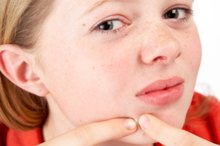How to Repair Scars on the Scalp
Scars on the scalp may be due to an injury sustained, acne, psoriasis, surgery or another skin condition 2. Often scalp scars reduce or inhibit the growth of hair. The scars can be a cause for embarrassment and you may notice a bald spot where the scar is. Depending on the severity of the scar, your options range from at-home natural remedies to surgical corrective procedures. Consult with your doctor to explore which option is appropriate for your scar.
Massage the scalp. Massage increases the blood flow to an area of the body and may help to stimulate cell regeneration on the scalp.
Drinking Alcohol and Scars
Learn More
Brew a chamomile tea and let it cool down to room temperature. Rinse the scalp with the tea and do not rinse out. Chamomile tea helps cure psoriasis, which may be a cause of scalp scarring 1.
Avoid scratching your scalp with the fingernails. Scratching could cause scalp scarring 1.
How to Get Rid of Scars on Toes
Learn More
Apply cocoa butter to the scar twice per day. Cocoa butter is naturally rich in emollients and allows the skin to heal as it protects it from harsh elements.
Consider tissue expansion surgery. During tissue expansion surgery, a small balloon is placed under the skin of the scar, and over a period of 10 to 12 weeks the skin is expanded gently.
Receive a hair transplant. During a hair transplant, hair on the back or sides of your head is grafted surgically in place of the scar tissue. This is especially useful for individuals who have a bald spot because of scarring.
Consider scalp flap surgery. In scalp flap surgery, a section of skin either grafted from the individual or harvested from a donor surgically replaces the damaged scar skin. The arteries and veins are reattached using microvascular surgery.
Tips
Wear a hat or head scarf if the scar causes you extreme discomfort.
Warnings
Consult with your doctor before trying a natural remedy.
Related Articles
References
- Fitness and Diet: Scalp Scarring
- Natural Skin Repair: Scalp Psoriasis
- Embarassing Problems: Scars
- Ranganathan S, Mukhopadhyay T. Dandruff: the most commercially exploited skin disease. Indian J Dermatol. 2010;55(2):130-4. doi:10.4103/0019-5154.62734
- Gavazzoni dias MF. Hair cosmetics: an overview. Int J Trichology. 2015;7(1):2-15. doi:10.4103/0974-7753.153450
- Datta HS, Mitra SK, Paramesh R, Patwardhan B. Theories and management of aging: modern and ayurveda perspectives. Evid Based Complement Alternat Med. 2011;2011:528527. doi:10.1093/ecam/nep005
- Carson CF, Hammer KA, Riley TV. Melaleuca alternifolia (Tea Tree) oil: a review of antimicrobial and other medicinal properties. Clin Microbiol Rev. 2006;19(1):50-62. doi:10.1128/CMR.19.1.50-62.2006
- Satchell AC, Saurajen A, Bell C, Barnetson RS. Treatment of dandruff with 5% tea tree oil shampoo. J Am Acad Dermatol. 2002;47(6):852-5. doi:10.1067/mjd.2002.122734
- Huang TH, Wang PW, Yang SC, Chou WL, Fang JY. Cosmetic and therapeutic applications of fish oil's fatty acids on the skin. Mar Drugs. 2018;16(8). doi:10.3390/md16080256
- Piccardi N1, Manissier P. "Nutrition and nutritional supplementation: Impact on skin health and beauty." Dermatoendocrinol. 2009 Sep;1(5):271-4.
Writer Bio
Nicole Carlin is a registered yoga teacher. Her writing has been published in yoga and dance teacher training manuals for POP Fizz Academy. Carlin received a Masters of Arts in gender studies from Birkbeck University in London and a Bachelors of Arts in psychology from Temple University, Philadelphia.









